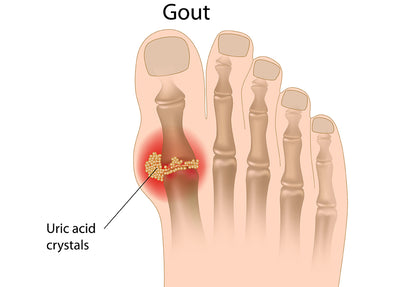
Gout: Pain and Relief
Gout is a particular form of arthritis, though most experts separate it into a higher, more complex form than what experts think of as arthritis. The condition can be mild to severe but in most cases, it prevents you from putting any weight on the affected area without experiencing pain and discomfort. Below, I'll take you through some signs and symptoms of gout, and various methods for gout pain relief and how to avoid a recurrence.
Gout Signs and Symptoms
Gout will typically flare-up in your joints without any warning. The sudden attack brings intense pain combined with tenderness in the affected joints and a deep red hue. The joints become swollen and for a variety of reasons, the joints in the large toe are the ones that most often see an attack of gout. Your big toe or other affected joints will feel as though they are on fire, being hot and tender to the touch. As I mentioned, tenderness will be so great that even the lightest pressure may bring you pain. You can check this list of typical symptoms against what you may experience to decide if it's gout. Of course, if you are experiencing unbearable joint pain and a fever, I recommend consulting a doctor, as this may be a sign of infection or other problems.
- Severe Pain in the Joints.
Although gout affects the joints in your big toes, it can spread or initialize in the hands, feet, knees, and elbows. The pain from gout is often severe.
- Redness and Swelling
The affected area will swell to abnormal size and bright redness and a tingling, intense heat will accompany this swelling.
- Limited Range of Movement
Because of the amount of pain you may experience in the joint, you may see a decrease in your ability to use the area to its fullest potential. The range of motion in your joints can become more limited should the condition spread to other areas.
- Persistent Discomfort
Although much of the pain happens during the first flare-up, you may experience discomfort in the joints well after primary symptoms have disappeared.
What Causes Gout?
Knowing what causes an attack of gout is half the battle in getting rid of it. The condition presents itself when your bloodstream has a high level of uric acid. This build-up of acid causes the inflammation and pain associated with gout. Your body produces uric acid as it breaks down natural substances in your body and of those found in food and drink. If your body produces too much of this acid or your kidneys don't expel enough of it, the accumulation can form sharp crystals that lead to gout. Foods to avoid include large amounts of both seafood organ meats as they can produce more of the acid that leads to gout.
Remedies and Treatments For Gout
Doctors often prescribe medications for gout prevention, and which medications work for you may be based on your medical health as diagnosed by your physician. However, there are also many natural remedies that can be used to treat gout, some of which include:
- Black Cherry Juice
Black cherry extract is a powerful natural remedy that contains compounds that break down uric acid in your bloodstream and reduce inflammation, so it's useful for both gout treatment of gout and preventing further flare-ups.
- Fish Oil
Fish oil isn't a fast-acting gout pain reliever, but it is very useful in protecting against gout long-term. There are numerous health benefits to taking fish oil thanks to the omega-3 acids found in it. Taking a small amount of fish oil in recommended doses can help your body build up a supply over time, ready to combat the next flare-up of gout.
- Magnesium
If you're magnesium deficient, your body is more susceptible to an attack of gout. Taking a natural magnesium supplement in small doses can normalize the magnesium in your blood and protect you against painful attacks of inflammation.
Other Remedies
A few studies have shown that some natural herbal remedies can reduce uric acid in the blood, thus lessening the potential for an attack of gout. Vitamin-C supplements or eating foods high in vitamin-C may reduce levels of this acid, although there isn't yet conclusive evidence it relieves the frequency or intensity of gout. But, anything that reduces one of the primary factors could be helpful to you.
You can make lifestyle changes that might help lessen the likelihood that you'll experience gout attacks. I recommend reducing your intake of food and drink that raises your uric acid levels and devise a plan for regular exercise. Excess weight increases the amount of this acid your body produces, thus increasing the likelihood of a gout attack.
Sources and Further Reading
Mayo Clinic
WebMD
MedicineNet
Arthritis.org
NIAMS


 {{/image.src}}
{{/image.src}}





